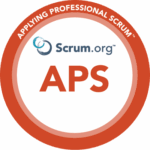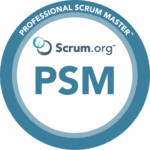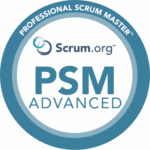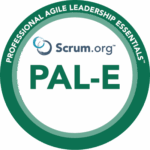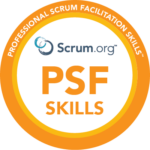Proper training is one of the key success factors in Agile transformations
37% of companies struggle with Agile adoption due to teams not understanding what Agile is.*
27% put it down to insufficient training.*
*Source: The 17th State of Agile Report
Help your teams overcome these challenges with the right training from an expert professional
Recognized
All training materials are created by licensed trainers and experience Agile leaders, so you can be sure to learn from the best.
Personalized
Every team and company is different. Focus on what really matters to your team right now by easily adjusting any part of the classes available.
Available
Whether your team is co-located or distributed accross the globe, we can easily bring them together in either in-person training, or an engaging online setting.
Find a class that works best for your team
Our classes and workshops
Applying Professional Scrum (APS)
The official Scrum.org class in which students experience Professional Scrum and the Scrum framework through running a series of Sprints and creating a product. This class is a great introduction to Agile and Scrum.
Professional Scrum Master (PSM)
This official Scrum.org class is focused on the role of the Scrum Master and intended for professionals new to Scrum. The class is a great introduction to both Scrum and Scrum Master responsibilities in a team.
Professional Scrum Master Advanced (PSM-A)
This official Scrum.org class is intended to help Scrum Masters with some experience in the role to take the next step in their career and their work, bringing new practices and tools they can use in their daily work.
Professional Agile Leadership Essentials (PAL-E)
This official Scrum.org class is focusing on the role of an Agile Leader and is a perfect introduction to new ways of working for anyone who is managing and leading a new or experienced Agile team.
Professional Scrum Facilitation Skills (PSFS)
This official Scrum.org class is an interactive course designed to help Scrum practitioners develop a facilitator’s mindset, proficiency in facilitation skills, and learn when and how to select effective techniques for various circumstances.
Agile & Scrum Reset
The goal of this workshop is to create alignment and help participants understand the why behind Agile and where it can be applied with the most success. This workshop also gives an overview of the Scrum framework, including the process, roles & responsibilities, and rules.
Product Definition and Forecasting Workshop
In this workshop, the team comes together to set the expectations around their product, its vision, customers, and success criteria. They also review various Agile practices and tools to help create forecasts and roadmaps that can be then implemented in their work.
Mastering Retrospectives Workshop
In this hands-on working session, we will focus on learning ways to make retrospectives, lessons learned, and post-mortems more productive and engaging with a bigger focus on finding solutions. It is intended for facilitators, team leads, and Scrum Masters working with Agile teams.
